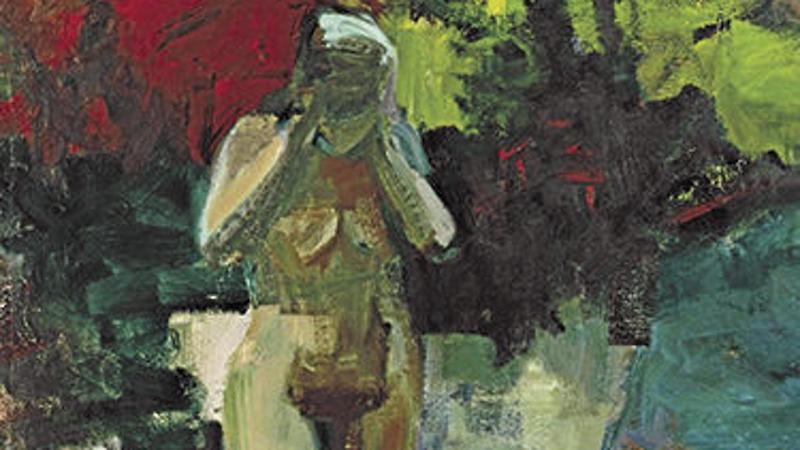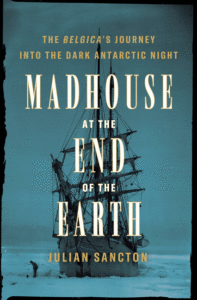
Our quintet of quality reviews this week includes James Wood on Francisco Goldman’s Monkey Boy, Jo Livingstone on Rachel Cusk’s Second Place, Ron Charles on Kristen Arnett’s With Teeth, Kim Tran on Akwaeke Emezi’s Dear Senthuran, and Geoff Dyer on Julian Sancton’s Madhouse at the End of the Earth.
“… a memory book, a novel that reads like an autobiographical immersion, a story that travels relentlessly between a difficult present and an unfinished past … full of rebellious comedy and vitality. Goldman is a natural storyteller—funny, intimate, sarcastic, all-noticing … The prose is loose-jointed, hybrid, elastic … The density of the memory, the playing over present and past, the essayistic space made for an ongoing political dimension, along with an insistent optimism—all these are characteristic of the novel as a whole, and of Goldman’s feel for a kind of narrative phrasing that allows an ideally sauntering and shifting perspective … steadily becomes a moving and tender elegy for a woman who seems to have spent most of her life suspended warily between visceral love of her birthplace and learned gratitude for her adopted home … impatient with conventional novelistic structuring, bolder in some respects than Goldman’s first novel, is desperate to seek a reckoning that, if it does not exactly lie beyond fiction, may sit uneasily within it … In The Long Night of White Chickens, the narrator’s father is portrayed as genial and sweet-natured, a truly good man. With terminal ferocity, Monkey Boy sets that record straight, bringing both parents out of fictional camouflage and into something that feels like the transparency of memoir.
–James Wood on Francisco Goldman’s Monkey Boy (The New Yorker)
“Over 15 books, one play, and many shorter published prose pieces, Rachel Cusk has accrued a reputation for regality. Although her subject has frequently been the messier side of living while female, a subject often associated with the messier side of writing, Cusk detractors and superfans alike have been provoked by her aesthetic of rigor and a ruthless commitment to real life. Her new novel, Second Place, is something of a departure from that persona, but one that turns directly to face its chief problems, including but not limited to egotism, gender stereotyping, and the confused ethical relationship between art and real estate … In memoir, Cusk has gone so far out to the hinterlands of cisgender heterosexual femininity that it has begun to liquidate underfoot; Second Place finds a more mythic setting for Cusk’s signature tensions. The protagonist is not caught in the troubled extremes of marriage; yet still, she feels trapped and humiliated, there is still the problem of being a woman … Having studied men and women like dangerous animals in her rigorous and ample work to date, from captivity to ferality and back again, in Second Place Cusk lets the male and female artists inside her loose on each other in a sealed compound. There, she finds the limits of detachment, and the possibilities opened up by occasionally allowing oneself to be provoked.”
–Jo Livingstone on Rachel Cusk’s Second Place (The New Republic)
“Kristen Arnett’s new novel, With Teeth, is the perfect baby shower gift for someone you hate. Absolutely captivating and scathingly frank, it’s a story of motherhood stripped of every ribbon of sentimentality. Arnett conjures up the disturbing mixture of devotion and alienation endured by anyone raising a child they don’t understand, don’t even like. And at its heart, With Teeth explores the way parenthood exacerbates our own vulnerabilities and delusions … If there’s a spike of horror running through With Teeth, it’s the turn of the screw that drives into an exhausted parent’s brain … Arnett is that rare, brave writer willing to articulate the darkest thoughts even the best parents entertain while trudging along through the most challenging job in the world.”
–Ron Charles on Kristen Arnett’s With Teeth (The Washington Post)
“In a world predisposed to queer villainy, Dear Senthuran claims monstrosity as a space of intentional rejection … Incrementally, the chapters inch closer and closer to a frightening reality … Identity is an undeniable part of Emezi’s project, but the memoir strays far from a traditional story of diaspora or gender …It was not written for you or for me; Emezi is not concerned with such earthly things. This is a book about terms, and the agency we can afford ourselves by doing away with them altogether. It is also an audacious sojourn through the terror and beauty of refusing to explain yourself in the relentless pursuit of self-actualization … Emezi has spent pages showing us the strain of living in a world where we’re forced to decide between two choices, and find that neither will suffice. Only an alternate path will do.”
–Kim Tran on Akwaeke Emezi’s Dear Senthuran: A Black Spirit Memoir (The New York Times Book Review)

“So a team defined by a lack of national unity or shared purpose sets off in the doughty Belgica and it’s not long before things start going wrong. A booze-fuelled mutiny is narrowly averted and the ship runs aground before they have even put the tip of South America behind them. Displaying the calm decision-making of a leader under pressure, De Gerlache runs through his options—and bursts into tears … De Gerlache, a leader of flickering competence, is prone to lyricism. The splendor of the icescape is such that even the austerely pragmatic Amundsen yields occasionally to a sense of the sublime; more typically, having managed a near-death escape, he writes: ‘I will not allow my plan to spend the winter on an iceberg to be influenced by this.’ Sancton’s own prose serves the reader well as he negotiates a path through what must have been a submerged mass of research documents. Except for odd moments…he coaxes his material into a watertight narrative. One member of the crew goes completely mad, the rest are exhausted, enervated, listless, forced to reassert themselves against their captivity when the sun reappears and the slow thaw brings hope and a new set of dangers. We’ll leave them there, two-thirds of the way through this utterly enthralling book.”
–Geoff Dyer on Julian Sancton’s Madhouse at the End of the Earth (The Guardian)

